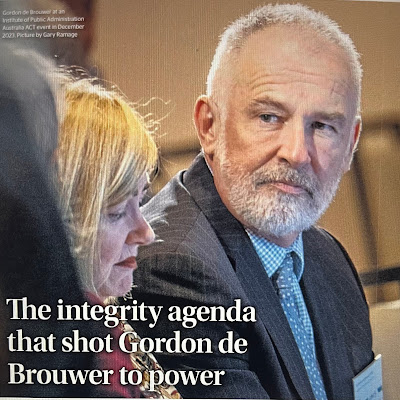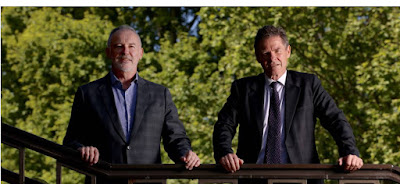The integrity agenda that shot Gordon de Brouwer to power
By Miriam Webber June 23 2025
They say the Auditor-General is the public sector's most unpopular job, but the role of Public Service Commissioner may come close to surpassing that.
Over the past three years, Gordon de Brouwer has been at helm of an extensive list of changes, made enemies along the way and faced backlash around whether he has gone too far enough to pull senior public servants in line.
As Public Service Commissioner - leading a small agency that acts as the bureaucracy’s HR and integrity unit - Dr Brouwer had been the right hand man to the country’s most senior public servant, Professor Glen Davis.
The pair worked together on the landmark Thodey Review, the foundation for many of the capability and integrity reforms brought in over the Albanese government’s first term. While Professor Davis set the direction, Dr de Brouwer was charged with implementing much of it. But Professor Davis’ retirement from the top job has sent a signal that the government is done with the heavy lifting of integrity reform, raising the question:
What has it achieved?
A typical bureaucrat or divisive figure? That story is also the story of Dr de
Brouwer’s time as Public Service Commissioner, a job he has held for less than
three years, though they have been some of the most tumultuous inside the
public service. You wouldn’t think of the senior public servant and former ANU
Professor as someone who courts controversy. Dr de Brouwer often answers Senate
estimates questions with philosophical monologues.
The commission’s offices, tucked away in Canberra’s Treasury
building, invoke Utopia, with pops of bright colour to break up the monochrome
grey. Both fairly standard bureaucratic traits. But in his two years in the top
job, Dr de Brouwer has overseen seismic shifts in the public service, including
the sacking of Mike Pezzullo, the naming and shaming of robodebt-era
secretaries Kathryn Campbell and Renee Leon and a broader trend of
accountability that led to 61 public servants being sacked last year. His decisions
deal with the public sector’s most powerful actors - people he has known and
worked with for years - and while some say the integrity agenda has been
uncontroversial amongst secretaries, others question his implementation of it.
Alongside the establishment of the federal
corruption watchdog, the reform list for the public service
has been extensive, including steps to expand the Public Service Commissioner’s
powers to investigate former agency heads, new powers for the commissioner to
initiate investigations, and the mandatory publication of staff survey results.
But while the government has been able to tick off a lot of items, former
Public Ser[1]vice
Commissioner Andrew Podger doubts their longevity.
He believes that Professor Davis and Dr de Brouwer restored
“a sense of normalcy” to the public service and its relationships with
ministers, but that key steps like merit-based appointment processes are
unsustainable without being legislated. “The weakness has been not putting
things in legislation, and without it in legislation, a new government could go
back to where we were,” Professor Podger said.
“And we saw that
intimated when Peter Dutton announced that he was going to reappoint the
disgraced Mike Pezzullo, which would have sent a terrible message to the public
service.” Controversy among colleagues Mr Pezzullo was sacked as a result of a
Public Service Commission inquiry into thousands of text messages he sent to a
Liberal powerbroker. That investigation was outsourced to former commissioner
Lynelle Briggs, and while Mr Pezzullo has accepted the findings, he disputed
that he should have paid for it with his job.
While his termination was not controversial, a rushed
decision by the Remuneration Tribunal to strip him of a standard salary payout
was. The change was not properly discussed at the monthly meeting between
secretaries, one former senior public servant said, and freedom-of-information
documents show secretaries including Ray Griggs, Natalie James and Steven
Kennedy pushed for more discussion of the issue. The tribunal is an independent
body the Public Service Commission said it did not advise it to make changes,
but the issue is seen as connected to the broader integrity agenda.
Meanwhile, attitudes to Dr de Brouwer’s leadership of the
robodebt response are splintered. Former officials, including Martin Parkinson
have questioned the commission’s findings against Renee Leon, who has expressed
her own disappointment. On the other hand, Dr de Brouwer has been criticised
for not naming 10 mostly senior public servants who were found to have breached
their obligations, including by this masthead. “I think that things like the
Code of Conduct inquiry revealed weaknesses from the Commission’s end, which
can’t be you can’t fully excuse the commissioner from,” Professor Podger said.
“In that respect, I still don’t understand why the
commissioner did not release a lot more detail, including the names of the
non-secretaries who were found to have breached. “He gave far more weight to
privacy than I would have thought. The public interest ought to have been given
the top weight, given the scale of damage done to so many hundreds of thousands
of Australians.” “The findings made in the robodebt Code of Conduct Taskforce
were robust,” a spokesperson for the Public Service Commission said. “The
investigations were independent, professional, forensic, objective, evidence-based
and fair. The public can have confidence in the process and the outcomes of
investigations.”
“The commissioner’s
judgement in the exercise of his statutory duties is that public servants
should not generally be publicly identified [during code of conduct investigations]
.... however, in the case of departmental secretaries, it may be reasonable in
all the circumstances to name the individual: an accountable authority should
ultimately be answerable to the public for their conduct in office.” The
spectrum of criticism levelled at Dr de Brouwer and the commission on robodebt
does show the difficulty of his position. One in which he is required to
balance the personalities of powerful colleagues, the political pressures from
above and the privacy demands of the law.
‘The best person to deliver and lead this agenda’ Yet for
all his detractors, he has supporters too. Katy Gallagher, who he is seen to be
close with, and who first brought him in as APS reform secretary, fiercely
defended him in the face of criticism of his handling of robodebt.
“It has been taken incredibly seriously and at some cost, I
would say, probably, for those that have had to lean in on it,” Senator
Gallagher said in a Senate estimates hearing in November 2024, sitting
alongside Dr de Brouwer. “But those individuals, they’ve been prepared to do so
because they know what is at stake here, which is a public service that must
stand up for its values, for its independence, and for good public policy in
this country.” Another former senior public servant, speaking on the condition
of anonymity, had only praise for him.
“He’s the best person
to deliver and lead this agenda on integrity because he demonstrates it in
everything he does,” they said. While another said secretaries got that
robodebt had to be dealt with strongly, but some felt that the unlawful scheme
had occurred in a couple of agencies, and led to the whole public service being
tarnished. “There were some differences of the edge and a little bit of
unhappiness,” they said. Though Professor Davis has stepped down, there is no
indication that Dr de Brouwer plans to follow suit - he still has more than two
years left of his term.
“It’s a decade of change that we’re looking at, and then that’s going to span a number of people, a number of offices,” he told The Canberra Times in 2023, days after taking on the job. The federal election campaign showed the fragility of the work that the Public Service Commission does, with threats by the Coalition to unpick conditions such as flexible work, and allusions to diversity positions that contrasted starkly against the commission’s priorities over the last term. A lot has changed in the public service over the last three years, but it could always change back. It means that Dr de Brouwer’s strongest legacy will likely be his response to robodebt, a response he stands by. “I think the transparency around people’s behaviour, conduct and what happened as a system is really important,” he said in September 2024.
In order to identify and foster the "pipeline of future potential leaders", Professor Davis and Dr de Brouwer collect intel from the heads of 22 departments and agencies on an annual basis.
These little catch-ups are officially termed "succession conversations", and in 2023 included an "increased focus on behaviour in support of sustainable delivery, greater openness to external talent and consideration of longer-term SES Band 2 prospects".
Five things we learned from the APSC’s Senate briefing notes

In Public Eye, Dana Daniel looks into the mystery that surrounds a limited tender awarded to a Rome hotel and restaurant for $28,309.60 by the Department of Defence, O week for pollies and she even manages to squeeze in some dog photos.
Jasper Lindell has some new details about the ACT's land release program, which is showing a very strong leaning to one type of development.
David Polkinghorne takes a look into how a Canberra team went from winning the national competition to out of it altogetherwithin a few months.
Globally, Pakistan has condemned the strikes ordered on its neighbour Iran by Donald Trump, a day after Islamabad had said it would nominate the US President for the Nobel Peace Prize. Meanwhile, Australia is considering its next steps.
After some more frost and fog in the morning, there's a high chance of showers, most likely in the evening, and an expected top of 15 degrees.



